RIKEN Early Career Leaders Program
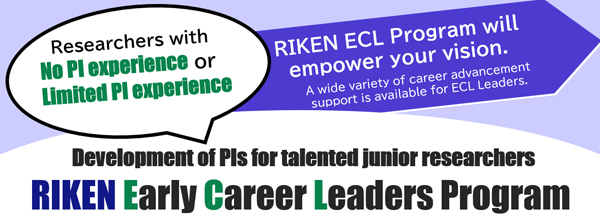
FY 2025 call for proposals
FY 2025 Call for RIKEN ECL Team / Unit Leaders
Overview
RIKEN has hired 13 researchers as Principal Investigators (PIs) under RIKEN Hakubi Fellows Program since 2018 and played a great role in nurturing excellent early career researchers. To develop support for junior researchers, we have established the RIKEN Early Career Leaders Program (ECL Program) using the concept of the Hakubi Fellows Program.
The RIKEN ECL Program offers 2 types of positions: Team Leader and Unit Leader. The positions focus on natural sciences (including mathematical science and information science) or research areas bordering/blending natural sciences with humanities and social sciences, and provide researchers with an appropriate research environment corresponding to their research plan and career stage.
Adequate operation expenses will be provided to open a laboratory so that successful applicants can hire researchers and technical staff. It is also possible for successful applicants to host Special Postdoctoral Researchers, JSPS Postdoctoral Researchers, Junior Research Associates, International Program Associates and RIKEN Student Researchers, using the headquarters’ budget. In the course of their research, they can use various RIKEN facilities and shared-use equipment and will have opportunities to interact with researchers in a variety of research fields.
They can get advice from mentors, experienced researchers, regarding laboratory management. Regardless of whether they serve as a Team Leader or Unit Leader, RIKEN can provide them with a variety of career paths, such as the indefinite-term PI position.
The RIKEN ECL Program holds a call for applications for the two positions starting in April 2023, with the aim that the personnel hired through this call will be able to start work at RIKEN in FY 2024. This program will support early career researchers who will launch their own laboratory and work on their research project at RIKEN.
RIKEN ECL Team Leader
For talented junior researchers who are willing to take on ambitious research with high scientific and social impact, this program offers the opportunity to become an independent PI and lead their own team to advance their research.
- Term: 7 years
- Salary: 910,000 JPY per month
- Research budget: an average of 30 million JPY per year
RIKEN ECL Unit Leader
For talented junior researchers who are willing to take on their own unique research, this program offers the opportunity to become an independent PI and develop the research. In particular, to promote employment of promising junior researchers, a flexible research environment will be provided at a research center or equivalent with which they will be affiliated.
- Term: 7 years (the term has been changed to 7 years from FY 2024)
- Salary: 710,000 JPY per month
- Research budget: an average of 10 million JPY per year
 Flyer for the FY 2025 Call for RIKEN ECL Team / Unit Leaders (Sechi Kato Program)
Flyer for the FY 2025 Call for RIKEN ECL Team / Unit Leaders (Sechi Kato Program)
Sechi Kato Program for RIKEN ECL Program
The Sechi Kato Program was established in FY 2018 with the aim of fostering promising female researchers with a global outlook and spirit of inquiry so that they can play a great role and lead other female researchers on the global arena. The program name is associated with a pioneering female scientist, Sechi Kato (1893-1989) who, in the field of chemical analysis, contributed to fostering female researchers in Japan, and was the first female Chief Scientist of RIKEN. For more information, please see ”Expand creativity and explore the future of science / Sechi Kato Program / Fostering of young women research leaders.” The Sechi Kato Program, which has been carried out under the RIKEN Hakubi Fellows Program, will be extended to the RIKEN ECL Program to offer Team Leader and Unit Leader positions for female researchers. The Sechi Kato Program provides research expenses up to 10 million yen annually to the RIKEN ECL Team/Unit Leaders in addition to the regular research expenses granted through the RIKEN ECL Program.
RIKEN ECL Principal Investigator
Meet a rising star at RIKEN | Interview
Leo Speidel, a Unit Leader in the RIKEN Early Career Leaders (ECL) Program, shares his insights on RIKEN's research environment, the strengths of the ECL program, daily life in Japan, and more.
Transcripts
RIKEN ECL Team Leader
Tadashi Hashimoto
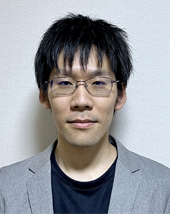
Name of laboratory
RIKEN Pioneering Research Institute Meson RIKEN ECL Research Team
RIKEN Nishina Center for Accelerator-Based Science Meson RIKEN ECL Research Team
Research topic
Exploring novel forms of matter containing an anti-kaon and interdisciplinary application of superconducting X-ray detectors
Self-introduction
How do the diverse matters around us evolve in the microscopic world, from quarks, the elementary particles, to nucleons (protons and
neutrons) and then to atomic nuclei? The fundamental theory of quantum chromodynamics should answer this question. However, many mysteries remain, such as how nucleons acquire mass and why there appears to be a hierarchy between nucleons and atomic nuclei. My approach to addressing these issues involves embedding mesons, which are quark-antiquark pairs, into atomic nuclei and measuring changes in the properties of mesons and atomic nuclei.
Additionally, I aim to expand the applications of superconducting X-ray detectors with excellent energy resolution, initially introduced for a nuclear physics experiment, to various fields such as atomic and molecular physics. (Starting date: April 1, 2024)
Shuntaro Tani
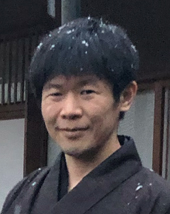
Name of laboratory
RIKEN Pioneering Research Institute Digital Twin for Light-Matter Interaction RIKEN ECL Research Team
RIKEN Center for Advanced Photonics Digital Twin for Light-Matter Interaction RIKEN ECL Research Team
Research topic
Constructing Digital Twin for Multi-Scale Phenomena Driven by Photo-Excitation
Self-introduction
With the advancement of laser technology, we can now apply laser fields onto materials, the strength of which is comparable to the interatomic bonds of the materials themselves. These strong and controllable light electric fields are expected to be utilized in precise laser processing and various forms of material state control. However, the physics underlying irreversible processes, such as the fragmentation of a continuous solid into discrete atoms, remains not fully understood. At present, extensive trial and error is necessary to control these processes. In this research project, we aim to develop a method to extract the 'context' of phenomena by extensively observing microscopic processes beginning with photoexcitation, through the complete automation of measurements. Utilizing this technique, we intend to elucidate the governing equations of materials' irreversible transformation and construct a digital twin for optimizing these processes. (Starting date: May 1, 2024)
Masayuki Oginuma

Name of laboratory
RIKEN Pioneering Research Institute Chrono-Developmental Biology RIKEN ECL Research Team
RIKEN Center for Biosystems Dynamics Research Chrono-Developmental Biology RIKEN ECL Research Team
Research topic
Elucidation of the time control mechanisms during embryonic development
Self-introduction
Organisms possess a remarkable 'blueprint of time'. Embryonic development, from fertilization to body formation, follows a precise schedule regulated by a clock mechanism encoded in the genes. However, the specific molecular mechanism remains largely unknown. The turquoise killifish, which inhabits an African pond, can suspend embryonic development and enter a diapause state for extended periods. My study aims to clarify the diapause mechanism of this highly evolved clock-stopping phenomenon and also apply this knowledge to other organisms, thereby revealing the molecular mechanism of the 'blueprint of time'. (Starting date: May 1, 2024)
Shihori Yokobayashi

Name of laboratory
RIKEN Pioneering Research Institute Epigenome Dynamics RIKEN ECL Research Team
RIKEN Center for Integrative Medical Sciences Epigenome Dynamics RIKEN ECL Research Team
Research topic
Understanding the molecular basis of epigenome diversity
Self-introduction
I am interested in the molecular mechanisms that give rise to phenotypic diversity and have studied the mechanisms of germline development and epigenome regulation. Epigenome information enables the generation of various cell types from a single genome information. Epigenome states are dynamically regulated during the development of an individual and throughout its life, but to what extent diversity (e.g., cell-to-cell heterogeneity and individual differences) emerges during the establishment and maintenance of epigenome state is not known. During the ECL program, I aim to understand the molecular basis of epigenome diversity and its effects on the response to environmental cues or cell fate changes through cell- and tissue-level analyses using mammals, including humans. In the future, I would like to explore the link between epigenome diversity and individual phenotypic diversity in disease susceptibility and other areas. (Starting date: August 1, 2024)
Reina Komiya

Name of laboratory
RIKEN Pioneering Research Institute Reproductive System RIKEN ECL Research Team
RIKEN Center for Sustainable Resource Science Reproductive System RIKEN ECL Research Team
Research topic
Reproductive Non-coding RNA System in Plants
Self-introduction
Throughout history, the Japanese have engaged in a continuous 2000-year journey intertwined with rice cultivation. The serene beauty of golden-hued rice fields has long evoked feelings of tranquility and joy in many, including myself. My research focuses on the reproductive system in rice, which profoundly connects to seed productivity. This research aim is to elucidate the molecular mechanism of numerous reproductive non-coding RNAs and their interactors in plant reproduction. As a final goal, I intend to develop the RNA regulation devices using functional RNAs that are respectively adapted under various environments. (Starting date: September 1, 2024)
Makoto Saito
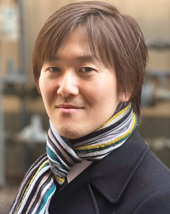
Name of laboratory
RIKEN Pioneering Research Institute Biophenomena Engineering RIKEN ECL Research Team
Research topic
Exploring natural diversity to develop next-generation therapeutics
Self-introduction
What drives my research is a curiosity about how assemblies of molecules can orchestrate life and a desire to apply our knowledge of this molecular orchestration to enable treatment of as many diseases as possible. The evolution of sequencing technologies has unveiled genome information from diverse organisms. However, we still have a limited understanding of the function of the biomolecules encoded in those blueprints of life, and how those biomolecules cooperate to give rise to the wealth of biophenomena around us. Just as the unique adaptive immune system of microorganisms, CRISPR-Cas, has been engineered to serve as a revolutionary genome editing technology, I believe there are unseen biological systems in nature that can be harnessed to solve the challenges facing humanity. With this belief, I aim to conduct AI-driven genome mining for biological systems with new modalities, biochemical analysis and engineering of the identified biomolecules, and ultimately establish next-generation therapeutics for hard-to-treat diseases. (Starting date: January 1, 2025)
Chisako Sakuma

Name of laboratory
RIKEN Pioneering Research Institute Metabolic and Behavioral Physiology RIKEN ECL Research Team
RIKEN Center for Biosystems Dynamics Research Metabolic and Behavioral Physiology RIKEN ECL Research Team
Research topic
Comprehensive elucidation of reproductive cycle switch mechanisms in mosquitoes
Self-introduction
Mosquitoes are familiar insects in our daily lives, yet they are notorious vectors of infectious diseases. I have been fascinated by the remarkable efficiency of mosquito blood feeding, as they can ingest large volumes of blood within minutes and have focused my research on uncovering the molecular mechanisms that regulate this behavior. Over time, I became increasingly interested in how ingested blood is sensed and utilized within the mosquito to drive reproductive processes. Female mosquitoes alternate repeatedly between two physiological states during their lifetime: a host-seeking phase, in which they carry immature eggs, and a reproductive phase, in which they use nutrients derived from blood meals to mature eggs. This switching between phases, known as the "gonotrophic cycle," is a tightly regulated process. By elucidating the mechanisms underlying this cycle, we may be able to induce mosquitoes to enter an egg-maturation mode without blood feeding, thereby suppressing host-seeking behavior. I aim to identify the molecular and physiological signals that control this switch by integrating approaches from neuroscience, endocrinology, and metabolism. This work may ultimately contribute to a better understanding of mosquito behavior and support the development of new strategies to reduce disease transmission. (Starting date: September 1, 2025)
RIKEN ECL Unit Leader
Yukako Fujishiro
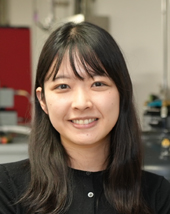
Name of laboratory
RIKEN Center for Emergent Matter Science Extreme Quantum Matter Physics RIKEN ECL Research Unit
RIKEN Pioneering Research Institute Extreme Quantum Matter Physics RIKEN ECL Research Unit
Research topic
Exploration of new electronic functionality in single-crystalline quantum materials under extreme conditions
Self-introduction
Quantum materials exhibit surprising phenomena due to complex interactions among electrons. My prior research focused on the exploration of electronic responses arising from topological spin textures and electronic structures. I often believed that with greater flexibility in manipulating materials’ parameters, such as lattice constants and carrier density, we could unlock even more intriguing electronic functionalities. Therefore, my research unit is dedicated to engineering quantum phase phases previously inaccessible with conventional methods. Specifically, we employ a microfabrication technique using a focused ion beam to induce high-density currents, apply ultra-high pressure, or perform ion-intercalation. These methods create “extreme” conditions within quantum materials, marking a significant step towards uncovering unprecedented electronic functionalities. (Starting date: April 1, 2024)
Toshitake Asabuki
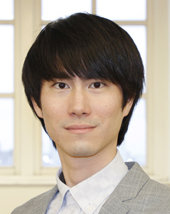
Name of laboratory
RIKEN Center for Brain Science Hierarchical Neural Computation RIKEN ECL Research Unit
RIKEN Pioneering Research Institute Hierarchical Neural Computation RIKEN ECL Research Unit
Research topic
Building brain-inspired neural circuit models for learning hierarchical predictive features
Self-introduction
The brain has the ability to learn new information and experiences and to adapt flexibly by integrating them with prior knowledge. This process requires the brain to hierarchically organize and abstract information to learn representation of the external world. I have mainly investigated how neural circuits learn salient features by mathematically modeling "synaptic plasticity", where connections between neurons adapt with experience. In the lab, I would like to build models of synaptic plasticity in which multiple neural circuits collaborate in learning and replicate existing experimental data. I believe this approach will deepen our understanding of the flexible processing of neural information. (Starting date: June 1, 2024)
Naoko Satoh-Takayama

Name of laboratory
RIKEN Center for Integrative Medical Sciences Precision Immune Regulation RIKEN ECL Research Unit
RIKEN Pioneering Research Institute Precision Immune Regulation RIKEN ECL Research Unit
Research topic
Spatial understanding of immune responses regulated by microenvironmental changes
Self-introduction
Having suffered from severe atopic dermatitis when I was childhood, I became interested in immunity, wondering why itching is induced and what the mechanisms are. These questions led me to pursue a career as an immunologist, which I continue to this today. This interest in understanding the immune responses subsequently led to the discovery of group 3 innate lymphoid cells (ILC3s), a new immune cell resides in the intestinal tract. The ILC3s are known to be strongly affected by changes in the microenvironment, altering the cell-phenotype and its function. In the future, I will aim to elucidate the mechanism by which microenvironmental changes regulate immune responses from a spatial perspective of tissues and organs. (Starting date: June 1, 2024)
Kei Murata

Name of laboratory
RIKEN Center for Sustainable Resource Science Molecular Photocatalysis RIKEN ECL Research Unit
RIKEN Pioneering Research Institute Molecular Photocatalysis RIKEN ECL Research Unit
Research topic
Development of innovative transition-metal catalyzed reactions driven by visible/near-infrared light
Self-introduction
I have been working on the development of visible/near-infrared light driven photoreactions using transition-metal complexes that contributes to various molecular systems such as the carbon dioxide conversion and the drug release. Photochemical reactions are attractive because they enable the use of solar energy as well as the reaction processes which are usually difficult to perform with thermochemical reactions, as in photosynthesis in nature. Photocatalysts are particularly useful as they realize a variety of molecular transformations using light energy through the construction of reaction cycles including substrate capture and product release processes in addition to a photochemical process. With cross-disciplinary research approaches based on organometallic chemistry, photochemistry and biochemistry, this research project aims to develop the new methodologies for molecular transformation reactions catalyzed by transition-metal complexes that contribute to solve global issues in the fields of environmental and medical sciences. (Starting date: September 1, 2024)
Dongbo Shi
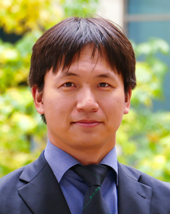
Name of laboratory
RIKEN Center for Sustainable Resource Science Cambial Stem Cell System RIKEN ECL Research Unit
RIKEN Pioneering Research Institute Cambial Stem Cell System RIKEN ECL Research Unit
Research topic
Elucidating the stem cell systems that enable continuous plant growth
Self-introduction
Many plants can continue to grow throughout their lives. Stem cells play an important role in the continued growth of plants, and among them, cambial stem cells have been the driving force behind the secondary growth of plants, contributing to the gigantic size of land plants. Cambial stem cells maintain themselves while differentiating into various cell types and change their activity in response to the environment, such as the seasons in coordination with surrounding cells. However, many of the underlying mechanisms are still unknown. By uncovering these mechanisms, we will reveal the plant-like nature of growth at the cellular level and explore the differences in survival strategies between plants and animals. (Starting date: October 1, 2024)
Leo Speidel

Name of laboratory
RIKEN Center for Interdisciplinary Theoretical and Mathematical Sciences Mathematical Genomics RIKEN ECL Research Unit
RIKEN Pioneering Research Institute Mathematical Genomics RIKEN ECL Research Unit
Research topic
Developing powerful statistical techniques to uncover human origins and millennia of genome evolution
Self-introduction
Differences in our DNA can reveal evolutionary events that have impacted our ancestors, such as prehistoric migrations and population mixtures, adaptation to changing climate, diet, pathogenic exposure, and technologies, or contact with now extinct sister species, such as Neanderthals. The product of this evolution, and its impact on human health, are now being uncovered by Biobank-scale sequencing projects around the world. Additionally, ancient DNA has arrived as a revolutionary tool enabling the sequencing of genomes of people living thousands of years in the past. In my work, I develop powerful statistical tools that leverage these data to uncover human evolution and its consequences for us today, from key events in a nation’s recent past to the earliest days of our species. We achieve this by reconstructing “genetic family trees” across the whole genome that trace genetic material through their common ancestors back in time, enabling us to study genome evolution up to millions of years in the past. (Starting date: November 1, 2024)
Mizue Anda

Name of laboratory
RIKEN BioResource Research Center Microbial Genomics RIKEN ECL Research Unit
RIKEN Pioneering Research Institute Microbial Genomics RIKEN ECL Research Unit
Research topic
Exploring uncharted terrains in microbial genomics using exceptional bioresources
Self-introduction
In bacteria, essential genes are typically located on the chromosome, while plasmids carry accessory genes—such as those conferring antibiotic resistance—that are advantageous under certain conditions but not indispensable for survival. I have been studying bacteria that defy this conventional genome organization, in which ribosomal RNA genes are located exclusively on small plasmids. Initially considered exceptional, these bacteria were later found to be phylogenetically diverse and to share a similar genome organization. Through genomic database exploration, we have shown that this seemingly unstable organization has been stably maintained over hundreds of millions of years. However, the mechanisms underlying this long-term stability and the biological significance of such a genome organization remain largely unknown. My research unit aims to address these fundamental questions and, by exploring the generality of newly uncovered "exceptions" identified during this research process, to open up new perspectives in microbial genomics. (Starting date: October 1, 2025)
Rina Tazai

Name of laboratory
RIKEN Center for Emergent Matter Science Strong Correlation Quantum Phase RIKEN ECL Research Unit
RIKEN Pioneering Research Institute Strong Correlation Quantum Phase RIKEN ECL Research Unit
Research topic
Microscopic Mechanisms of Quantum Phase Transitions and Transport Phenomena in Many-Body Electron Systems
Self-introduction
I am interested in understanding how the 10²³ electrons in a material collectively behave to give rise to a variety of phenomena that would be impossible for a single electron to exhibit. This curiosity drives my research in condensed matter theory. It is well known that when metals are cooled, they can undergo phase transitions into states where the spins of electrons or the phases of their wave functions align collectively, leading to phenomena such as magnetism and superconductivity. These phase transitions are fundamentally driven by many-body effects among electrons, but many aspects of these effects remain unexplained.
For example, in recently discovered kagome metal systems, sequential phase transitions driven by the charge degrees of freedom have been observed. However, the precise nature of the electron correlations responsible for such rich phase diagrams is still not fully understood. Moreover, the behavior of many-body electron systems when driven out of equilibrium by light irradiation, as well as their transport properties, remain areas of active development. Through the study of these many-body electron systems, which exhibit fascinating behaviors under various conditions, I aim to uncover new possibilities within solid-state materials. (Starting date: April 1, 2026)
Yoko Chiba

Name of laboratory
RIKEN Center for Sustainable Resource Science Environment-Oriented Metabolism RIKEN ECL Research Unit
RIKEN Pioneering Research Institute Environment-Oriented Metabolism RIKEN ECL Research Unit
Research topic
Exploring diversity and design principle of metabolisms and enzymes
Self-introduction
Metabolism is a series of chemical reactions that provide energy and materials for organisms, and is an essential system to sustain life. I have been identifying unknown metabolic pathways in microorganisms and found the diversity in metabolic pathways and the enzymes involve in at various levels including networks, genetics, and kinetics. Here, I will explore the hypothesis that the diversity in metabolic pathways and the enzymes is caused by the adaptation to the metabolic environment of each organism. The findings will unveil the design principles of metabolism and enzymes in living organisms. (Starting date: April 1, 2026)
Contact
Research Personnel Development Section, Human Resources Strategy Division, Human Resources Group, RIKEN
Email: ecl-program@ml.riken.jp
